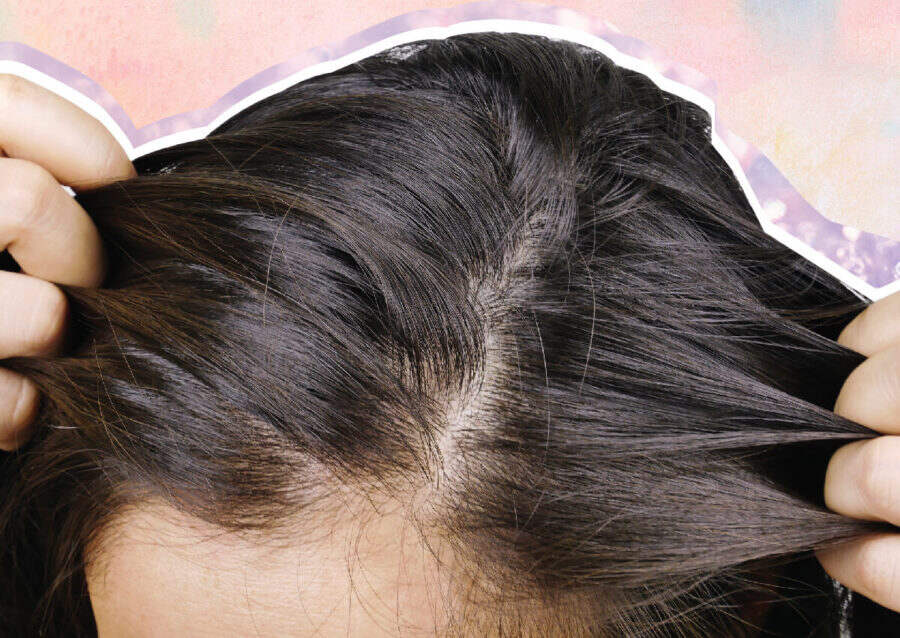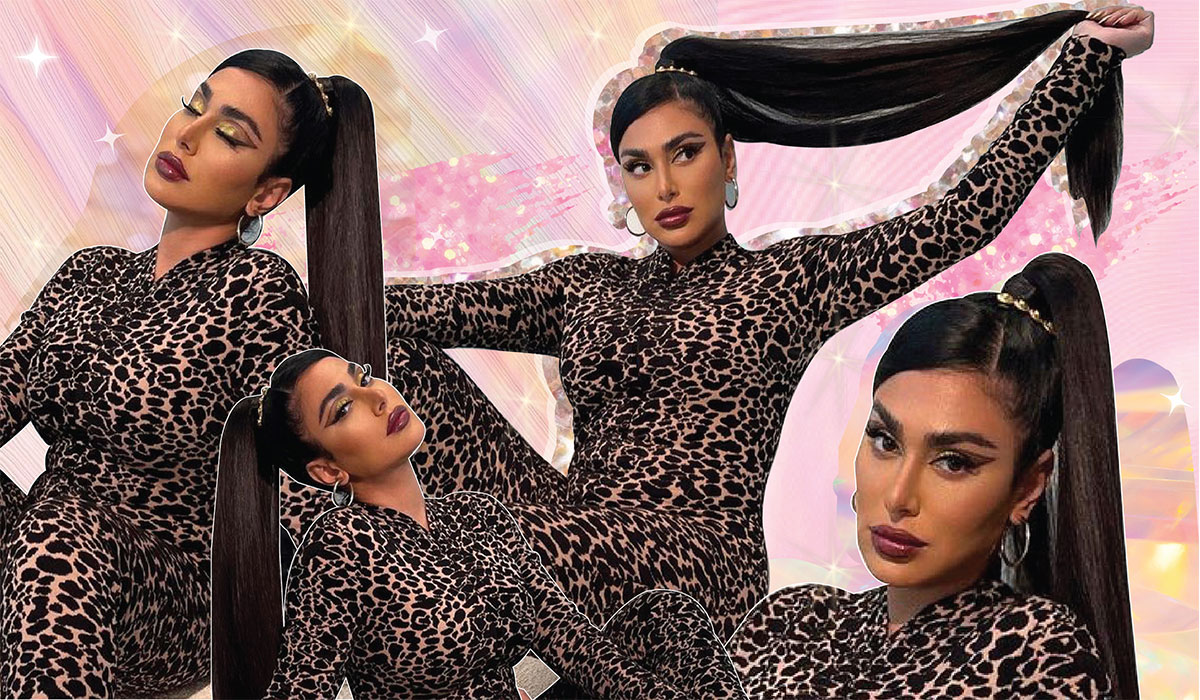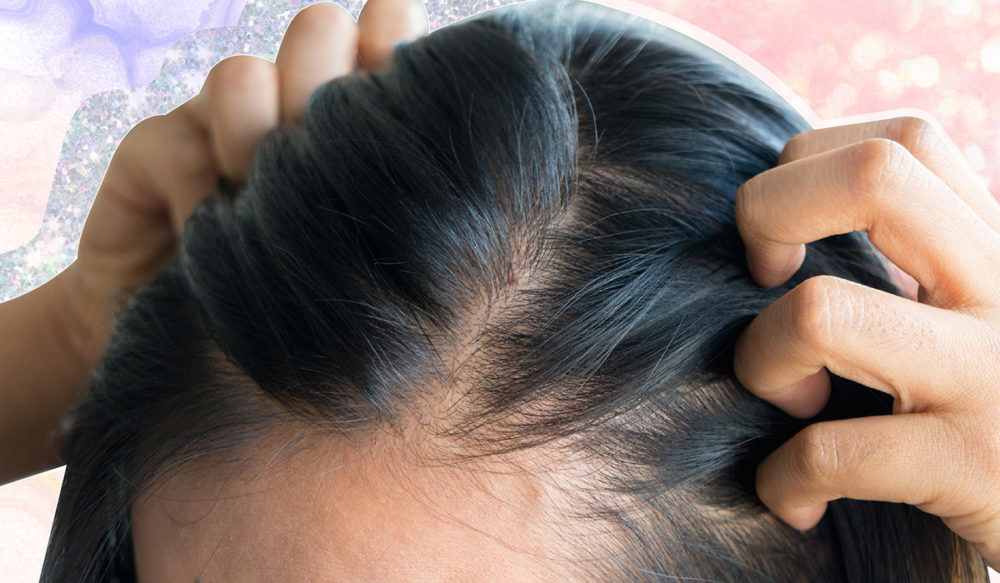A Derm Reveals How To Fix Hormone-Related Hair Loss

Have you ever brushed your hair and been slightly concerned about the amount of hair nestled between the bristles? Or snatched your tresses into a ponytail and examined your thinning hairline? Well, we have. The reality is: hair loss is super common among both men and women. However, for women, it’s one of those beauty concerns that is rarely discussed. In fact, many people associate hair loss with men, but a new study by Nioxin shows that 40% of women have suffered from hair loss. The study also revealed that 79% of women believed their hair was a huge part of who they are.
It’s clear that hair loss is a major concern for both men and women, so we got in touch with the experts to give us the full scoop on hormone-related hair loss. We all know when it comes to our body and our hormones, knowledge is power, and knowing more about hormone-related hair loss can you help you understand if your hormones could be the issue and what you can do.
How Hormones Affect Hair Growth
@dermguru##pcos ##pcosawareness ##hairloss ##alopecia ##learnontiktok ##tiktokpartner ##skincaretiktok ##dermguru ##dermatologist♬ Get Into It (Yuh) – Doja Cat
While most associate hair loss with stress or genetics, board-certified dermatologist, Dr. Lindsey Zubritsky (AKA TikTok’s @dermguru), insists “Hormones in both men and women can commonly cause hair loss or hair growth.” Specifically, she notes, “the hormone dihydrotestosterone (also known as DHT, it’s a hormone for which testosterone is its precursor) is responsible for the most common type of hair loss: male and female patterned hair loss.”
She continues, “An increase in this male hormone, especially in women, leads to thinning hair and hair loss as well as hirsutism or unwanted hair growth in areas like the lip, chin, chest, and back.”
Hair loss will also fluctuate as we age, in line with hormonal changes. Dr. Zubritsky confirms, “In women, it can happen due to menopause, or a condition called PCOS. The enzyme that converts testosterone to DHT is located in the hair follicles, which is why an increase in DHT can affect our hair.”
Another period of time in which women are likely to experience hormone-related hair loss is post-partum. According to Co-Founder of HAIRtamin, Leyla Milani, “Hair loss is very common among pregnant women, and it’s especially prevalent in the postpartum stage of pregnancy.” This is due to many factors, but it’s mostly caused by the dramatic increase in estrogen and progesterone during pregnancy that levels out and drops following childbirth.
How to Determine if Your Hair Loss is Hormone-Related
Both my hair and my baby’s hair are falling out 😩 ##learnontiktok ##reasonswhy ##hairloss ##alopecia ##derm ##dermguru ##skindoctor ##4yp♬ Whip My Hair – WILLOW
Determining what’s causing hair loss can be a long process as there are many factors that can contribute, from stress to styling as well as your lifestyle choices.
However, Dr. Zubritsky says, “If someone has a specific pattern of hair loss, it might be a clue that hormones are the underlying cause. For example, for men, they will notice balding in the crown of the scalp or receding hairline while women may notice thinning of their entire scalp, especially thinning of their hair part.”
Posts You'll Love:
How to Balance Hormones to Prevent Hair Loss
When it comes to treatment for hair loss, Dr. Zubritsky said “For women, a medication called spironolactone or oral contraceptive pills can be helpful.” She confirms, “Both of these medications can affect our hormone levels and help to restore the proper balance in our hormone levels to improve hormonal-related hair loss.”
“For men, medications that target the levels of DHT and testosterone can help with male pattern hair loss. For example, minoxidil (Rogaine) and finasteride (Propecia) are regularly prescribed medications that have been proven to help hair regrow,” says Dr. Zubritsky.
Dr. Zubritsky Top Tips for Boosting Hair Growth
@dermguru##biotin doesn’t work. I said what I said ##derm ##hairloss ##hair ##hairlossremedy ##drugstore ##dermguru ##fyp ##viral♬ Sex and the City (Main Theme) – TV Sounds Unlimited
“Other than seeing a dermatologist for diagnosis and treatment recommendations, I recommend a well-balanced and nutritional diet in addition to stress reduction. This also ensures that vitamin levels are sufficient,” says Dr. Zubritsky.
One vitamin that’s particularly beneficial according to Dr. Zubritsky is vitamin D, as a vitamin D deficiency can actually be the cause of hair loss or hair thinning. She adds, “I also like nutraceuticals like Nutrafol or Viviscal, which have been proven to help hair regrow.” We can totally vouch for the efficiency of Viviscal Max Strength Tablets, $40; although, a word of warning, they’ll boost hair growth all over the body, from your scalp and lashes to your brows and underarms!
For more on hair loss, check out Huda’s journey with hair loss and the best treatments.
Disclaimer: Every product we review has been independently selected and tested without bias by our editorial team. We never take payment to review products, however, some brands allow affiliate links, so we may earn a commission if you purchase a product by clicking on one of our links.























Leave a comment